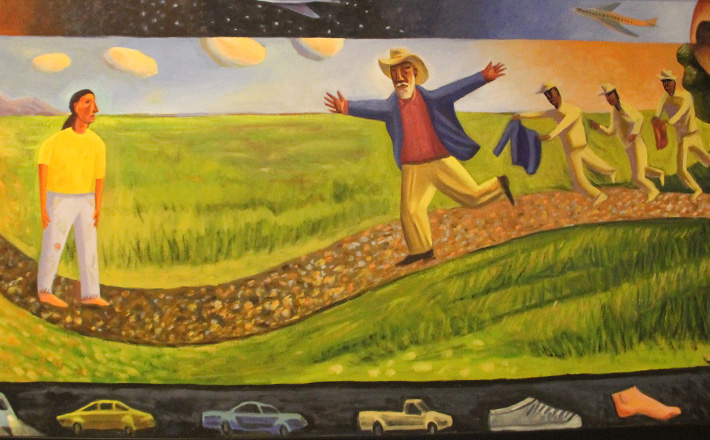Commentary on 2 Corinthians 5:16-21
In 2 Corinthians 5:16-21, Paul reminds the Corinthians that God’s new creation has dawned, and they are part of God’s handiwork.
As recipients of God’s grace, they are called to share the good news of God’s reconciliation.
“Human Point of View”
It is unfortunate that most English translations render the Greek phrase kata sarka, literally “according to flesh,” as “from a human point of view.” For Paul, “flesh” (sarx) is not simply a “human point of view.”
Rather, the apostle speaks of the “flesh” as a power that is diametrically opposed to God’s Holy Spirit. According to Romans 8:1-17, to live according to the flesh is to have a mind that is hostile to God and a life that displeases God. Living according to the flesh leads to death (Romans 8:6, 13).
For Paul, the desires of the flesh are in no way congruent with the fruit of the spirit (Galatians 5:16-24). In Galatians 5-6, the fruit of the spirit is the very sign of God’s act of new creation — God’s act of transforming and redeeming and calling all people into newness of life.
In 2 Corinthians 5:16, when Paul says that he no longer knows anyone “according to the flesh,” Paul is again acknowledging his life in Christ and the Holy Spirit’s work within him (see, for example, 2 Corinthians 3:5-6; 4:13-15; 5:5). God is the one who has granted Paul this new perspective (5:18). God has rescued him from the power of the flesh and enabled him to walk according to the Spirit.
The New Has Come
The Spirit’s work is the guarantee that the new age has dawned (5:5). The new and the old represent kingdoms that are fundamentally at odds with one another. God’s kingdom is the new age, and it has been inaugurated in the life, death, and resurrection of Jesus.
This not the first time that Paul has written to the Corinthians that the old is passing away. In 1 Corinthians, Paul frequently reminds this church that they are waiting for the fruition of the new age when Jesus will come again (for example, 1 Corinthians 1:7-8; 3:13; 11:26; 10:11; 16:22). The apostle has already acknowledged that this world is passing away (1 Corinthians 7:31).
In the same vein, Paul’s writing in 2 Corinthians does not attempt to hide the conflict between the old and the new, but rather highlights the tension. Paul sees the struggles of the church in light of a larger cosmic conflict between God and all anti-God powers. In 2 Corinthians 2:11, Paul shows concern that Satan not gain the advantage. In 4:4, it is the “god of this world” who is actively working to blind humanity to the truth of the gospel.
In chapter 3, he words the conflict in terms of two dispensations: the dispensation of death (3:7) and the dispensation of the Spirit (3:8), which he also equates with righteousness (3:9).
In 2:4, Paul acknowledges that God has triumphed over the anti-God powers and allows all who are “in Christ” to share in this triumph. The triumph is over all the anti-god rulers of the “old” age, whether death, sin, flesh, or Satan.
The Spirit is the very guarantee that all who are in Christ participate in this victory (2 Corinthians 5:5). God’s kingdom is invading the “old” age and is at war with it. But Paul knows that through Christ, God has already claimed the victory. When Christ comes again, God’s kingdom will make the world right, as God intended it to be.
New Way of Knowing
In the movies The Truman Show or The Matrix, the main characters each face a crisis of learning that the world that they have always known is not the “real” world. For Neo in The Matrix the world he knows is a complete fabrication, but learning this information places him in a war in the real world. For Truman, the world and lifestyle created for him by a TV producer are not satisfactory to him once he discovers that there is a whole new world beyond his experience. Knowing that there is another world makes him long to experience it. Neither character can go back to life as normal because they have a new way of knowing. They are now aware that the real world is beyond anything that they previously imagined.
The revelation of Jesus to Paul has produced such a crisis (Galatians 1:12, 16). Seeing the resurrected Lord has changed how Paul sees the world all around him. Paul is now aware that God has invaded the world as he knows it. The old is passing away. The world that Paul knew is not all there is. The new has dawned. God is in the business of rectifying God’s creation, and Paul has seen God in action. He cannot go back to life as normal.
The distinctions that matter in the old world — Jew and Gentile, male and female, slave and free — do not matter in the real world. Because in this new world, God is reconciling all to Godself — regardless of gender, status, sexuality, identity, or position. All are enemies of God and stand in need of reconciliation.
Ministry of Reconciliation
Christ’s death and resurrection represent God’s victory over all the powers that stand between humanity and God. God is reconciling the world. Through Christ, God has defeated the reign of sin. Thus, humanity no longer has to be enslaved to sin’s power (see also Romans 5). Rather, as Paul says in Romans 5:10, “while we were enemies we were reconciled to God by the death of his Son.” As a recipient of God’s acts of reconciliation, Paul is committed to being an ambassador of this new age (5:20).
Being reconciled to God indicates that God’s Holy Spirit is at work to sanctify the reconciled into vessels of God’s righteousness. It is amazing that Paul can say to this church in Corinth, a church that has bickered with him and challenged him, that God is powerful enough not only to reconcile them to Godself, but also to transform them into “the righteousness of God.”
God’s righteousness is on the loose. God’s kingdom has dawned. There are glimpses of God’s new creation even in the struggling church at Corinth. God’s power to rectify simply cannot be contained. For a world held captive to all manifestations of sin’s power — to fear, anxiety, social injustices, war, starvation, and exploitation — this is good news, indeed.


March 10, 2013